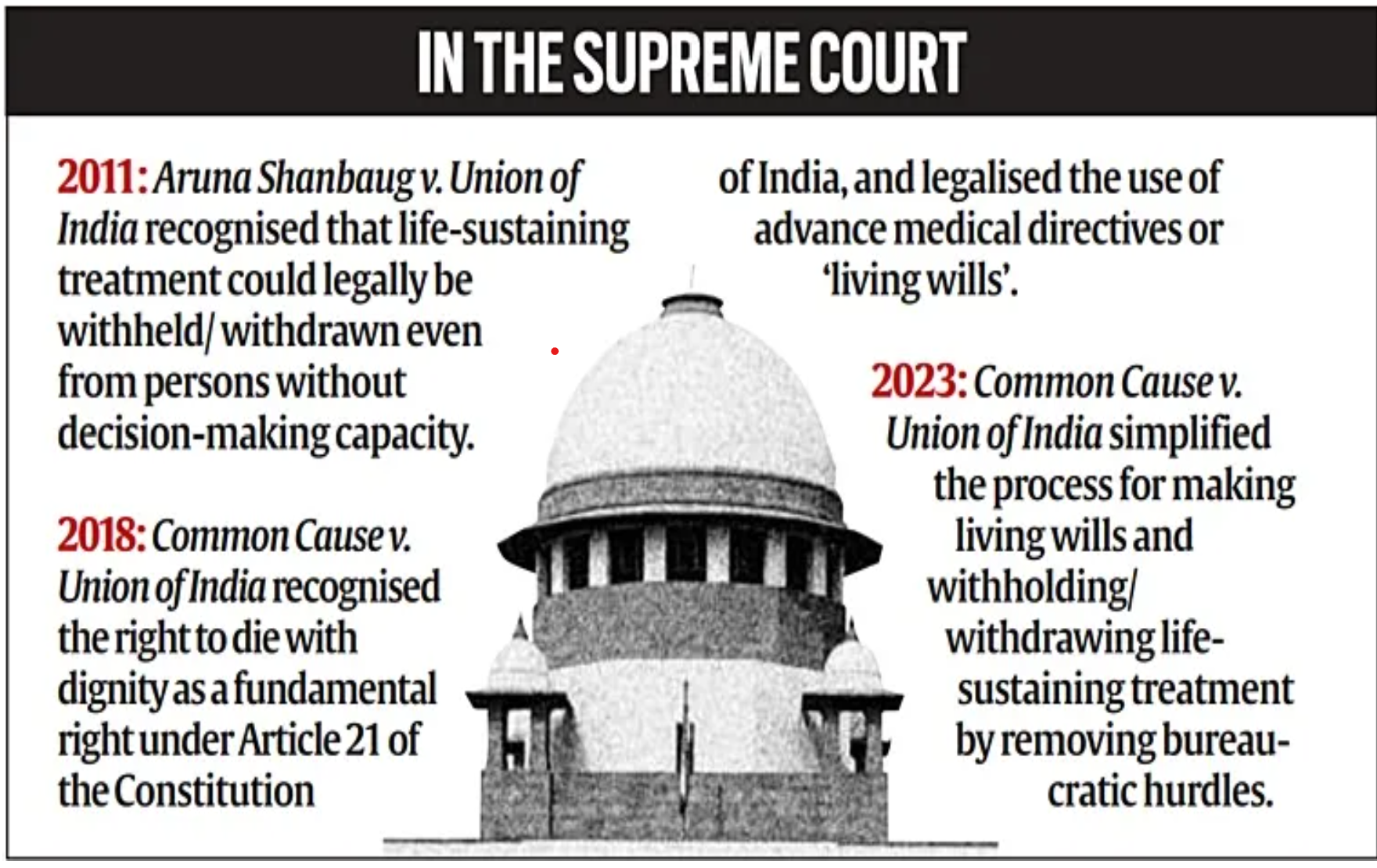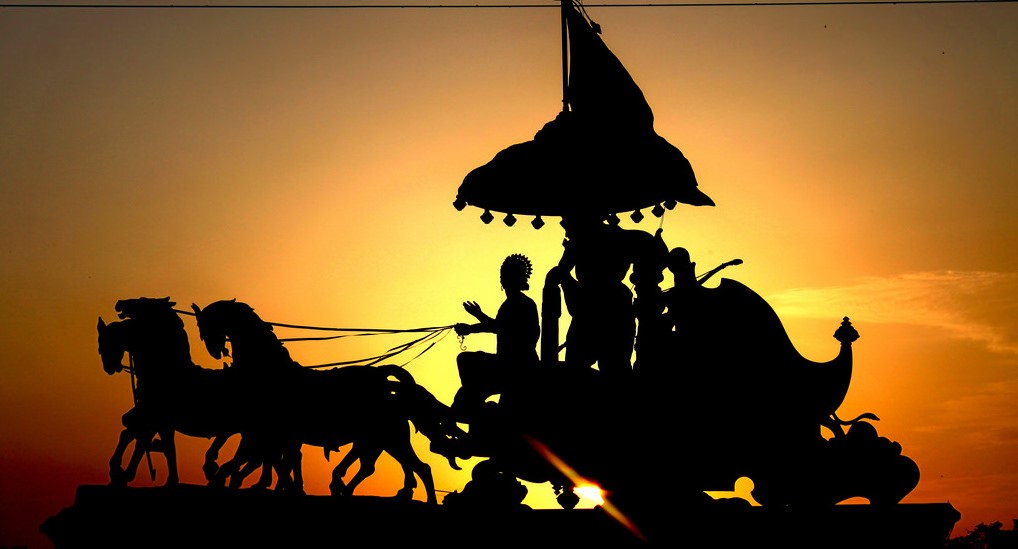The right to die with dignity

- 26 Oct 2024
In News:
- The Ministry of Health and Family Welfare's draft guidelines (October 2024) aim to implement the Supreme Court's 2018 and 2023 orders on the right to die with dignity.
Legal Context: Supreme Court Rulings and Constitutional Rights
- Right to Refuse Treatment:
- Common Law & Article 21: The right to refuse medical treatment is grounded in common law and is now recognized as a fundamental right under Article 21 of the Indian Constitution, following the 2018 Supreme Court judgment in Common Cause v. Union of India.
- Supreme Court Rulings: The court's rulings in 2018 and 2023 affirmed that individuals have the constitutional right to refuse life-sustaining treatment and to die with dignity.
Withholding and Withdrawing Life-Sustaining Treatment
- Definition and Meaning:
- What Is Life-Sustaining Treatment? Life-sustaining treatments, such as ventilators and feeding tubes, artificially replace vital bodily functions to sustain life.
- Withholding/Withdrawal: This refers to discontinuing these treatments when they no longer improve the patient's condition or merely prolong suffering.
- When Is It Done?
- End-of-Life Care: Withholding or withdrawing treatment is considered when further medical intervention is futile and would only artificially prolong the dying process.
- Focus on Comfort: After withdrawing life-sustaining measures, the focus shifts to palliative care to alleviate pain and suffering.
Understanding Euthanasia and Misconceptions
- What Is Euthanasia?
- Definition: Euthanasia refers to the intentional ending of a terminally ill patient’s life by medical professionals to relieve suffering.
- Passive Euthanasia Misconception: In India, the term "passive euthanasia" is often mistakenly used to describe withholding or withdrawing life-sustaining treatment, but this does not involve the active killing of the patient.
- Legal Framework: The Indian Council of Medical Research (ICMR) clarified in 2018 that "passive euthanasia" is not a legally accepted practice in the country.
The Role of Doctors: Ethical Dilemmas and Shared Decision-Making
- Is Withdrawing Treatment "Giving Up" on the Patient?
- Not Abandonment: Withdrawing life-sustaining treatment is not about abandoning the patient but recognizing when further interventions would cause unnecessary suffering.
- Palliative Care: The patient’s comfort and dignity are prioritized through palliative care, which focuses on pain management and emotional support for both the patient and family.
- Doctors' Ethical Responsibility:
- Shared Decision-Making: The process encourages a collaborative approach between doctors and the patient’s family or surrogate decision-makers. This joint decision-making ensures that the wishes of the patient are respected and relieves the doctor from bearing sole responsibility for life-and-death decisions.
Living Wills and Advance Medical Directives
- What Is a Living Will?
- Definition: A living will is a legal document where a person outlines their medical preferences in the event they lose decision-making capacity.
- Eligibility and Process: Individuals aged 18 or older, who are capable of making decisions, can draft a living will, naming at least two trusted surrogate decision-makers.
- Legal Requirements: The document must be signed in the presence of an executor, two witnesses, and notarized to be legally binding.
- 2023 Supreme Court Guidelines: The Court simplified the procedure for making living wills to ensure that the right to die with dignity is upheld.
Medical Procedure for Withholding or Withdrawing Treatment
- Supreme Court Guidelines
- The Supreme Court laid out a clear procedure for withholding or withdrawing life-sustaining treatment, emphasizing patient autonomy, expert assessments, and family consent.
- Primary and Secondary Medical Boards:
- Primary Medical Board: The treating hospital sets up a Primary Medical Board, consisting of the treating doctor and two subject-matter experts, to assess the patient's condition and determine if life-sustaining treatment is appropriate.
- Secondary Medical Board: A Secondary Medical Board, comprising independent experts, reviews the Primary Board's decision for added oversight.
- Consent from Family/Surrogate Decision-Makers:
- The patient’s wishes, as outlined in an advance directive or by a surrogate, must be respected, and their consent is essential for proceeding with treatment withdrawal.
- Judicial Oversight:
- Once the decision to withdraw treatment is made, the hospital is required to notify the local judicial magistrate, ensuring transparency and accountability.
Conclusion: Legal and Ethical Clarity in End-of-Life Care
- Shared Decision-Making: The process ensures that medical teams, families, and surrogate decision-makers collaborate, preventing any medical professional from facing moral or legal dilemmas alone.
- Protection of Autonomy: These frameworks and guidelines uphold patient autonomy, offering a legal and ethical pathway for terminally ill patients to exercise their right to die with dignity.
A Message on the Model Code of Conduct for Leaders – From Mahabharata and Beyond

- 24 May 2024
Why is it in the News?
In a democracy, while elections are imperative, it's equally crucial for both the populace and our leaders to retain their moral integrity, as a loss of ethical grounding could result in repercussions that extend far beyond the periodic act of political selection.
Context:
- Satyameva Jayate ("Truth alone triumphs") from the Mundaka Upanishad was adopted as the national motto on January 26, 1950, the day India became a Republic.
- A day earlier, the country's Election Commission was formed with the primary responsibility of enabling citizens to exercise their democratic right to choose a government.
- The Election Commission is expected to provide a level playing field so that candidates, political parties, and their campaigners do not unduly influence voters through excessive use of money, force, or dishonesty.
About The Model Code of Conduct (MCC):
- The Election Commission of India introduced the Model Code of Conduct with the hope that it would encourage self-control among political stakeholders.
- The 2019 Manual emphasized that those seeking public office should behave in a way worthy of being emulated by others.
- The Commission considers the Code an important contribution by political parties to democracy.
- It expects parties to exhibit model behaviour in their actions and rhetoric.
- However, reality often deviates from this expectation. Political discourse sometimes degrades into coarse and ignoble exchanges.
- This has led to debates on whether it should be called a moral code rather than just a model code.
The Complexity of Truth from a Philosophical Perspective:
- Francis Bacon's Essay of Truth commences with Pilate's profound questioning, "What is truth?" - a query that resonates through the ages, its answer shrouded in layers of complexity.
- This intricate nature finds symbolic representation in the Ashokan pillar's trio of visible lions, embodying the three dimensions of truth: my viewpoint, your perspective, and an objective third-person narrative.
- Yet, there exists a fourth, unseen dimension - that of absolute truth, often perceived as knowable only to a higher power.
- Amidst this philosophical labyrinth, the Election Commission of India (ECI) navigates the realm of human imperfection, striving to enforce the Model Code of Conduct (MCC) – a framework designed to curb dishonest practices during the electoral process.
- However, expecting individuals to adhere to this model solely for the duration of elections, if they have not upheld such principles in their daily lives, could be considered a naive endeavor.
The Intersection of Morality and Law in the Electoral Process:
- Foundations of the Model Code of Conduct (MCC):
- At the core of the Model Code of Conduct lies a fundamental interplay between legal requirements and moral expectations.
- Morality governs individual behaviour based on notions of right and wrong, often rooted in cultural, religious, or personal beliefs.
- Law, conversely, comprises rules established by a governing authority to regulate conduct and ensure order and justice within society.
- Philosophical perspectives offer valuable insights into this dynamic. Immanuel Kant's philosophy distinguishes between morality and law, viewing moral actions as those driven by a sense of duty, while societal rules govern legal actions.
- Utilitarianism, advocated by thinkers like Jeremy Bentham and John Stuart Mill, evaluates actions based on their consequences and their contribution to the overall well-being of society.
- In the context of the Model Code of Conduct, this perspective suggests that political behaviour should be assessed not only against legal standards but also by its broader impact on societal harmony and democratic health.
- Legal Framework and Enforcement:
- The legal framework encompassing the Model Code of Conduct includes specific provisions in the Indian Penal Code and the Representation of the People Act, 1951.
- These laws define actions that constitute corrupt practices and electoral offences, providing a legal basis for enforcing the Code.
- However, the intersection of morality and law within this framework presents unique challenges.
- In legal terms, "mens rea" refers to the intention or knowledge of wrongdoing, and establishing mens rea is crucial for proving guilt in many cases.
- The Model Code of Conduct implicitly addresses mens rea by prohibiting actions intended to manipulate or deceive voters, such as false promises or appeals to communal sentiments.
- Sections 123(3) and 123(3A) of the Representation of the People Act classify appeals to caste or communal feelings as corrupt practices, punishable under the law.
- Similarly, Section 125 prohibits promoting enmity between different groups in connection with elections.
- These legal provisions aim to curb divisive tactics and uphold the ethical conduct envisioned by the Model Code of Conduct.
- However, enforcement requires clear evidence linking the actions to the intent of influencing electoral outcomes.
Ethical Reflection in the Electoral Process & Lesson from Mahabharata:
- Upholding Integrity: The imperative for ethical reflection in the electoral process stems from the need to uphold the integrity of democracy itself.
- The conduct of elections must align with the core values of truth and fairness that underpin the democratic ethos.
- Ethical Lesson from Mahabharata: The story of Yudhishthira in the Mahabharata, who lost his moral high ground despite technically telling the truth, underscores the importance of ethics over mere adherence to rules.
- Ethics in elections transcends simply following the law; it involves adhering to higher standards of honesty, integrity, and fairness.
- Moral Soundness over Legal Compliance: Ethical reflection ensures that political actions and decisions are not just legally compliant but also morally sound.
- This is particularly crucial in a democracy, where the legitimacy of the government is derived from the consent of the governed, and this consent must be obtained through fair means.
- Safeguarding Democratic Norms: When ethical standards are compromised, democratic norms such as transparency, accountability, and fairness are weakened.
- This erosion can lead to a governance crisis where the authority of elected officials is questioned, undermining the very foundation upon which democracy rests.
Conclusion
“Satyameva Jayate” is not just India’s motto however it encapsulates a guiding principle that should permeate the conduct of individuals and institutions alike. The Election Commission of India's efforts to enforce the Model Code of Conduct reflect an ongoing struggle to strike a delicate balance between legal enforcement and moral persuasion. For a truly democratic society to thrive, this equilibrium must be continually sought and maintained. The pursuit of political power must never be allowed to erode the foundational value of truth upon which the democratic edifice rests. By upholding the principle of Satyameva Jayate, not just in rhetoric but in action, the integrity of the electoral process and the sanctity of democratic norms can be safeguarded, ensuring that the will of the people remains the cornerstone of governance.
